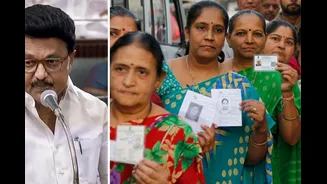Event's Controversial Action
The crux of the controversy lies in the alleged singing of the RSS Gana Geet by students at the inauguration of the Ernakulam–Bengaluru Vande Bharat service.
Chief Minister Pinarayi Vijayan condemned this action, viewing it as a violation of constitutional principles. He specifically targeted the Southern Railway, accusing them of promoting communal politics by incorporating the song into an official government event. The incident has raised questions about the neutrality expected in public events and the potential for political ideologies to influence official programs. Rajya Sabha MP John Brittas also weighed in, stating that Indian Railways had 'stooped to new depths' in this regard. Vijayan further criticized the act, emphasizing that such actions undermine the secular character of government events.
Vijayan's Strong Criticism
Vijayan's criticism was direct and forceful, as he did not mince words in his condemnation. He labeled the act as 'unacceptable,' highlighting his concerns over the use of government platforms for propagating specific ideologies. He underscored the importance of maintaining a secular environment, particularly in official programs. Vijayan saw the inclusion of the RSS song as a deliberate attempt to infuse communal elements into a government event. This perspective reflects his broader concerns regarding the RSS, which he has previously compared to Zionists, suggesting a shared ideological foundation. His response also includes a call for public protest, indicating his strong conviction that such actions should not be tolerated. Vijayan's stance is further amplified by his assertion that the Railways, which played a pivotal role in India's secular nationalism during the freedom struggle, are now supporting the RSS agenda.
Violation of Principles
The core of Vijayan's argument centers on the violation of constitutional principles. He argued that the inclusion of the RSS song, which he claims spreads hatred and promotes communal divisiveness, in a government program is a direct infringement of the constitution's secular foundations. Vijayan views the event as a manifestation of a narrow political mindset aimed at dismantling secularism. He believes that the government’s endorsement of such activities constitutes a 'grave insult' to the Constitution. The Chief Minister's criticism extends beyond the immediate incident, touching upon broader concerns about the erosion of secular values within the government and the potential for religious and political agendas to infiltrate public spaces. He highlighted that the act was a deliberate undermining of the secular character of government events.
Railways' Role Examined
Vijayan specifically targeted the Southern Railway, accusing the organization of supporting the communal agenda of the RSS. He pointed out that the Railways had historically served as a cornerstone of India's secular nationalism during the freedom struggle. However, according to Vijayan, the Railways are now complicit in promoting the RSS's agenda, which he believes 'betrayed the freedom struggle.' This perspective suggests a significant shift in the role of the Railways, from a symbol of unity and secularism to an instrument of divisive politics. The CM condemned that the Southern Railway shared the 'Gana Geet' on social media with the caption 'a patriotic song,' which he considered a mockery of the Indian national movement. He highlighted that even the announcement of new services is now marked by political fanfare while sidelining people’s representatives.
Broader Political Implications
The controversy surrounding the Vande Bharat event underscores broader political implications in India. Vijayan's criticism reflects the ongoing debate over secularism and the role of religious and political ideologies in public life. The incident highlights the tensions between different political factions and their divergent views on national identity and governance. His remarks are part of the larger political narrative, which includes the discussion of RSS and Zionists, indicating a trend of identifying commonalities in their ideologies and actions. The controversy also raises the question of whether government institutions are maintaining neutrality or are being used to further specific agendas. This event may have a significant effect on the public's perception of the relationship between government bodies and political organizations.












